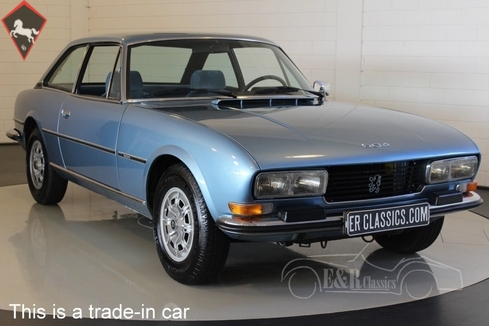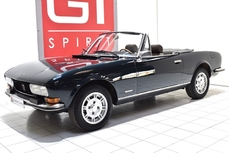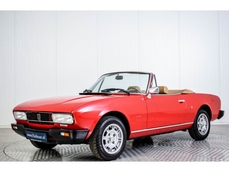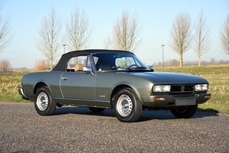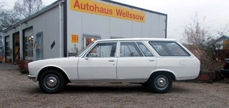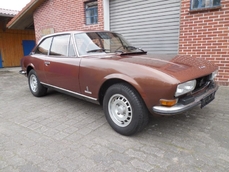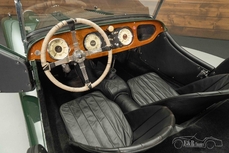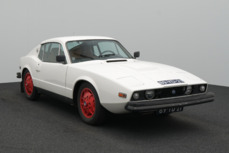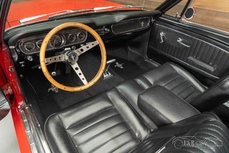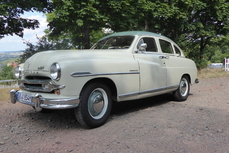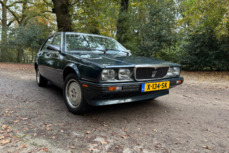Peugeot 504 1979
General description :
This is a ‘trade-in’ car. A bargain for someone who wants to register or optimize the car himself!
Because of the current workload in our workshop we sell this car 1:1, the way it was bought by ER Classics. No guarantee. Transport possible.
Peugeot 504 Coupe 1978 V6 Blue Metallic
This is a 1978 Peugeot 504 V6 Coupe. The car has paint in the colour Bleu Argente Metallisé with a cloth interior. Optically in neat condition and a perfect car for the hobbyist.
https://www.erclassics.com/classic-cars-for-sale/peugeot-504-1979-p7903/
1979 Peugeot 504 is listed sold on ClassicDigest in Waalwijk by E R Classics for €16950.
Car Facts
Car type : Car Make : Peugeot Model : 504 Engine size : 0.0 Model Year : 1979 Sub type : Coupé Location : Waalwijk
Sold
Seller Information
Sold
People who viewed this Peugeot 504 also viewed similar Peugeot listed at ClassicDigest
Other cars listed for sale by this dealer
About Peugeot
Peugeot, a renowned French automobile manufacturer, is recognized for producing sensible yet stylish vehicles known for their reliability, comfort, and innovative engineering. Here's an overview of Peugeot's history up to the iconic 205 GTI and its larger siblings:Peugeot: A Sensible Legacy
Early Years and Foundation:
Origins: Founded in 1810 as a family-run manufacturing business, Peugeot initially produced various products, including coffee mills and bicycles.
Transition to Automobiles: The company ventured into automobiles in the late 19th century, producing its first automobile in 1889.
Milestones and Noteworthy Models:
Peugeot 201 (1929-1937):
Significance: Considered one of the early successful mass-produced cars, marked by its reliability and affordability.
Innovation: Featured a robust and economical four-cylinder engine.
Peugeot 203 (1948-1960):
Post-War Success: A symbol of the company's resurgence after World War II, known for its durability and comfortable ride.
Technical Advancements: Introduced independent front suspension and hydraulic brakes.
Peugeot 404 (1960-1975):
International Recognition: Enjoyed global success, lauded for its reliability, ruggedness, and stylish design.
Variants: Available as a sedan, wagon, and convertible, becoming an emblematic Peugeot model.
Peugeot 205 (1983-1998):
Cult Classic: The iconic 205 became a symbol of Peugeot's excellence in the small car segment, offering versatility, practicality, and spirited driving dynamics.
205 GTI (1984-1994): The GTI variant gained legendary status, acclaimed for its sporty performance, handling, and driving experience.
Legacy and Innovation:
Engineering Excellence: Peugeot became synonymous with technological innovation, embracing advancements in engine technology, safety features, and design aesthetics.
Reliability and Durability: Known for producing cars with a reputation for reliability and minimal maintenance, establishing trust among consumers.
Larger Siblings and Family Heritage:
Peugeot 305, 405, and Beyond: Peugeot's larger models, like the 305 and 405, carried forward the brand's reputation for comfort, reliability, and practicality.
Family Traits: Maintaining Peugeot's commitment to quality, these larger models offered a blend of comfort, durability, and European elegance.
Conclusion
Peugeot's journey from its early days to the iconic 205 GTI and larger models like the 305 and 405 reflected a commitment to engineering excellence, reliability, and a sense of practical luxury. The brand's legacy of producing sensible yet stylish cars, often requiring minimal maintenance, solidified its position as a trusted name in the automotive world, particularly during the 20th century.
